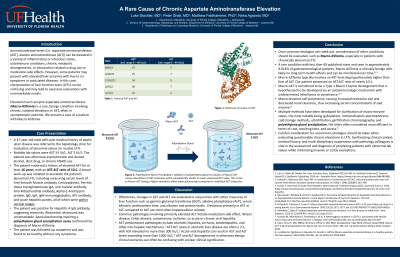Monday Poster Session
Category: Liver
P2999 - A Rare Cause of Chronic Aspartate Aminotransferase Elevation
Monday, October 28, 2024
10:30 AM - 4:00 PM ET
Location: Exhibit Hall E

Has Audio

Luke Stachler, MD
University of Florida College of Medicine
Jacksonville, FL
Presenting Author(s)
Luke Stachler, MD, Maged A.. Ghali, MD, Matthew Feldhammer, PhD, Neha Agrawal, MD
University of Florida College of Medicine, Jacksonville, FL
Introduction: Elevated liver enzymes can indicate a wide range of liver or systemic diseases, from benign conditions to those causing fulminant liver failure. We present a case of a middle-aged male with chronically elevated aspartate aminotransferase (AST), one of the two aminotransferases (the other being alanine aminotransferase (ALT)) that typically signify hepatocellular injury.
Case Description/Methods: A 47-year-old male with no significant medical or surgical history was referred for elevated AST levels found on routine tests. On presentation, his AST was 54 IU/L, and ALT was 5 IU/L. He was asymptomatic and his physical examination was unremarkable. He denied alcohol and illicit drug use and was not on any medication or herbal supplements. He had isolated elevated AST for at least 16 years. Comprehensive tests ruled out chronic viral hepatitis, autoimmune hepatitis (AIH), hemochromatosis, alpha-1 antitrypsin (AAT) deficiency, Wilson’s disease, and celiac disease. A normal abdominal ultrasound excluded steatosis and infiltrative diseases. Suspecting Macro-ASTemia, a polyethylene glycol precipitation assay confirmed the diagnosis. The patient continues to remain healthy.
Discussion: Liver enzyme elevations can be categorized as hepatocellular (predominant AST and ALT elevation), cholestatic (elevated gamma-glutamyl transferase and alkaline phosphatase), or mixed. Hepatocellular elevation can be either acute or chronic. Chronic elevations can result from viral hepatitis, fatty liver disease from alcohol or metabolic dysfunction, AIH, and drug/toxin exposure and necessitates a thorough laboratory, imaging, and sometimes histopathologic workup. Alcoholic liver disease often shows an AST/ALT ratio of ≥2:1, with AST < 300 IU/L. Other causes include hemochromatosis, AAT deficiency, celiac disease, Wilson’s disease, and infiltrative processes. Most chronic elevations are asymptomatic. Our case is unique as Macro-ASTemia is a rare condition with fewer than 40 published cases with no known long-term health consequences despite chronic enzyme elevation. It should be suspected if common pathologies are excluded. Macro-ASTemia involves an AST/ALT ratio close to 10:1 and is hypothesized to be autoimmunologic with unclear inheritance or penetrance. Macro-enzymes self-polymerize, increasing molecular size which decreases renal clearance. Polyethylene glycol precipitation is preferred due to its cost effectiveness, shorter wait time and ease of access.
Disclosures:
Luke Stachler, MD, Maged A.. Ghali, MD, Matthew Feldhammer, PhD, Neha Agrawal, MD. P2999 - A Rare Cause of Chronic Aspartate Aminotransferase Elevation, ACG 2024 Annual Scientific Meeting Abstracts. Philadelphia, PA: American College of Gastroenterology.
University of Florida College of Medicine, Jacksonville, FL
Introduction: Elevated liver enzymes can indicate a wide range of liver or systemic diseases, from benign conditions to those causing fulminant liver failure. We present a case of a middle-aged male with chronically elevated aspartate aminotransferase (AST), one of the two aminotransferases (the other being alanine aminotransferase (ALT)) that typically signify hepatocellular injury.
Case Description/Methods: A 47-year-old male with no significant medical or surgical history was referred for elevated AST levels found on routine tests. On presentation, his AST was 54 IU/L, and ALT was 5 IU/L. He was asymptomatic and his physical examination was unremarkable. He denied alcohol and illicit drug use and was not on any medication or herbal supplements. He had isolated elevated AST for at least 16 years. Comprehensive tests ruled out chronic viral hepatitis, autoimmune hepatitis (AIH), hemochromatosis, alpha-1 antitrypsin (AAT) deficiency, Wilson’s disease, and celiac disease. A normal abdominal ultrasound excluded steatosis and infiltrative diseases. Suspecting Macro-ASTemia, a polyethylene glycol precipitation assay confirmed the diagnosis. The patient continues to remain healthy.
Discussion: Liver enzyme elevations can be categorized as hepatocellular (predominant AST and ALT elevation), cholestatic (elevated gamma-glutamyl transferase and alkaline phosphatase), or mixed. Hepatocellular elevation can be either acute or chronic. Chronic elevations can result from viral hepatitis, fatty liver disease from alcohol or metabolic dysfunction, AIH, and drug/toxin exposure and necessitates a thorough laboratory, imaging, and sometimes histopathologic workup. Alcoholic liver disease often shows an AST/ALT ratio of ≥2:1, with AST < 300 IU/L. Other causes include hemochromatosis, AAT deficiency, celiac disease, Wilson’s disease, and infiltrative processes. Most chronic elevations are asymptomatic. Our case is unique as Macro-ASTemia is a rare condition with fewer than 40 published cases with no known long-term health consequences despite chronic enzyme elevation. It should be suspected if common pathologies are excluded. Macro-ASTemia involves an AST/ALT ratio close to 10:1 and is hypothesized to be autoimmunologic with unclear inheritance or penetrance. Macro-enzymes self-polymerize, increasing molecular size which decreases renal clearance. Polyethylene glycol precipitation is preferred due to its cost effectiveness, shorter wait time and ease of access.
Disclosures:
Luke Stachler indicated no relevant financial relationships.
Maged Ghali: Gilead – Grant/Research Support. Madrigal – Grant/Research Support. Novo Nordisk – Grant/Research Support.
Matthew Feldhammer indicated no relevant financial relationships.
Neha Agrawal indicated no relevant financial relationships.
Luke Stachler, MD, Maged A.. Ghali, MD, Matthew Feldhammer, PhD, Neha Agrawal, MD. P2999 - A Rare Cause of Chronic Aspartate Aminotransferase Elevation, ACG 2024 Annual Scientific Meeting Abstracts. Philadelphia, PA: American College of Gastroenterology.
